Conference on Alternative Dispute Reesolution, 30 November – 1 December 2016
PrintCONFERENCE ON ALTERNATIVE DISPUTE RESOLUTION IN HUNGARY
2016 also represented a voluntarily undertaken challenge for the Financial Arbitration Board. It organised, jointly with the Magyar Nemzeti Bank and the National Office for the Judiciary, the first such conference in Hungary that covered the entire field of alternative dispute resolution and presented, as broadly as possible, the individual alternative dispute resolution forms, the organisations operating in this area, their situation and achievements.
In recent years an increasing number of customers have turned to alternative dispute resolution forums, acting faster and more flexibly, thereby avoiding lengthy and costly litigations. The organisations dealing in Hungary with alternative dispute resolution, i.e. court mediators, out-of-court mediators, financial and other conciliation boards, the courts of arbitration and the registration arbitrator successfully contribute several ten thousands cases annually to the amicable settlement of disputes and the conclusion of settlement agreements between the parties.
The Board undertook a major role in the organisation and management of the conference held between 30 November and 1 December 2016, thereby also fostering the improvement, spreading and popularisation of domestic alternative dispute resolution culture, and the further social and professional support of the organisations pursuing this activity.
The Board developed a subsite on its website (https://www.mnb.hu/bekeltetes/avrkonferencia), where all information related to the conference is still available, including, among others, the programme, the introduction of the speakers, the list of the organisations exhibiting an electronic poster, the list of participating organisations engaged in alternative dispute resolution with a link to their own website, and the summary of the content of the presentations.
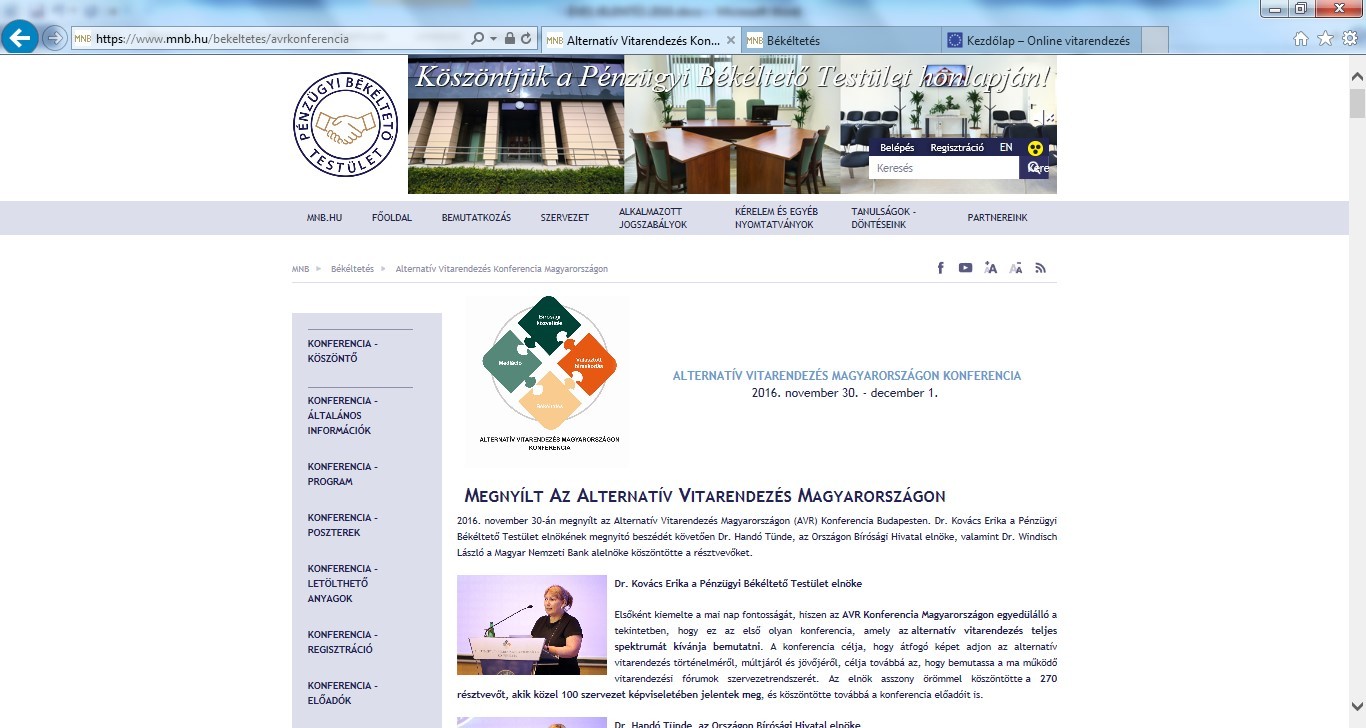
The interest in the topic and the event is well reflected by the fact that the number of visitors of the website in the preparation period, during the event and thereafter exceeded 9 thousand.
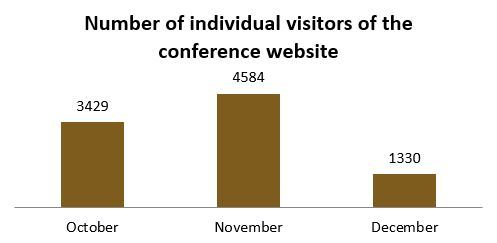
The conference was attended by 270 persons, representing almost 100 organisations. After the opening address by the Chair of the Financial Arbitration Board, Dr. Tünde Handó, President of the National Office for the Judiciary and Dr. László Windisch, Deputy Governor of the Magyar Nemzeti Bank welcomed the participants.
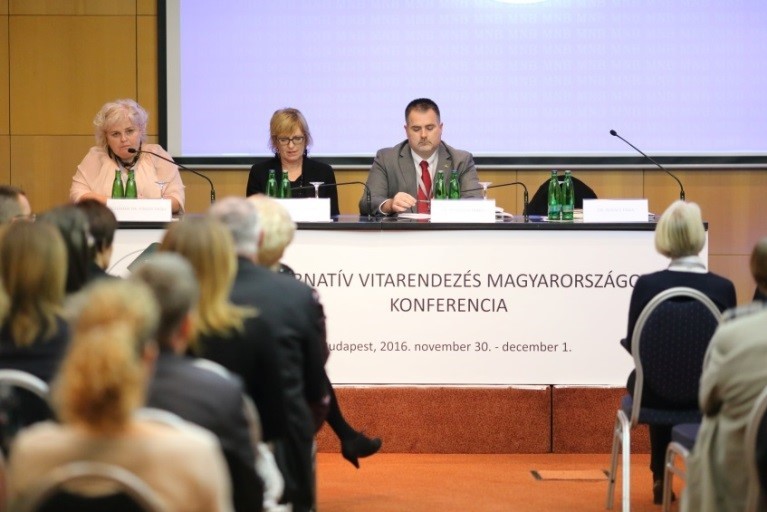
Dr. Tünde Handó, President of the National Office for the Judiciary, emphasised in her opening speech that it is more important for the parties to conclude a settlement agreement they agree with and can identify with than a good judgement. In relation to the court mediation procedure, she stated that the procedure is led by skilled mediators and the option can be freely elected by the parties. Among the advantages of the procedure, she emphasised that it saves time and it is free of charge. In the last 4 years 2,826 procedures were conducted, and the success is evidenced by the fact that half of the procedures ended with a settlement agreement.
Dr. László Windisch, Deputy Governor of the Magyar Nemzeti Bank, said in his welcome speech that it is particularly important for the parties to the dispute to find a quick solution for their problems. He emphasised that dispute resolution should be not only fast and simple, but also easily accessible. The foundation of the financial system is trust, and during dispute resolution the desired objective is to reinstate this trust as soon as possible and to preserve it in the future. This is also assisted by the Financial Arbitration Board, already in the fifth year of its operation, the procedure of which is fast, free of charge and simple.
The opening presentation of the conference was delivered by Dr. Váradi Csema Erika, Deputy Dean of the University of Miskolc, Chair of the Alternative Conflict Management and Dispute Resolution Interdisciplinary Research Centre of the Faculty of Law at the University of Miskolc, entitled “The system of alternative dispute resolution, resolution of legal disputes as the old-new form of conflict management”.
In her presentation she went back to the historic roots of conflict management and dispute resolution, also evaluating alternative solutions. She deemed it necessary to emphasise that trust in the alternative dispute resolution institutions must be maintained in society, which requires cooperation between the professional areas.
The introduction of the Hungarian actors of alternative dispute resolution was preceded by a brief international outlook. Dr. iur, LL.M Rita Simon made a presentation entitled “Alternative dispute resolution – Europe and the Czech Republic”, touching upon the diversity of alternative dispute resolution in relation to the EU Member States, and she also outlined the Czech model. Ildikó Gaal-Baier, a mediator working in Germany, presented to the audience the German solution for alternative dispute resolution, comparing it to the Hungarian features.
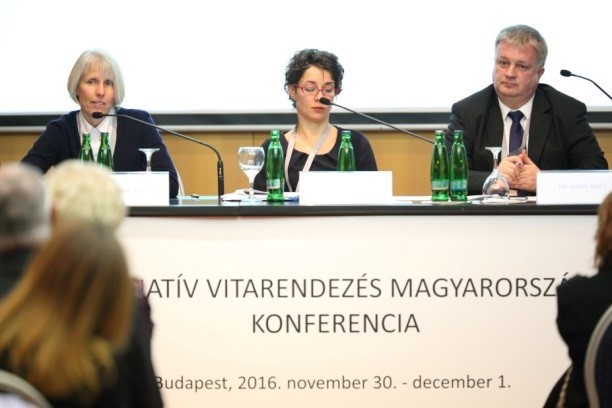
The Hungarian model, objective and feature of court mediation, representing an important pillar of the domestic alternative dispute resolution, was presented by Dr. Katalin Turcsánné Molnár, Chair of the Székesfehérvár Tribunal and Chair of the Court Meditation Working Group of the National Office for the Judiciary. She said that the legal institution has been in place for four years, at about 70 courts 130 court mediators are in service, supported by further 345 skilled colleagues, judges and court secretaries engaged in this activity. The speaker emphasised that the significance of this legal institution lies in the increasing number of settlement agreements, which is attributable to comprehensive information and to the fact that the parties are increasingly aware of the advantages of this procedure.
The daily practice of court mediation was described by Dr. Ákos Hegedűs, judge of the Regional Court of Eger, in his presentation entitled “The judge as the key to the success of court mediation”. He characterised mediation with the need for a mentality that substantially differs from the mentality of judges, and he also mentioned that some means of mediation can be successfully supplemented with the judges' work. He designated it as one of the most important roles of alternative dispute resolution that it is capable of eliminating certain injustice. Namely, what is important for the parties is to enforce their own justice rather than what the reality is, and the key objective of court mediation is to “reconcile” the parties' justice. It is not always possible to resolve the dispute between the parties by the means of law, and these are exactly the cases when alternative dispute resolution at court can be applied.
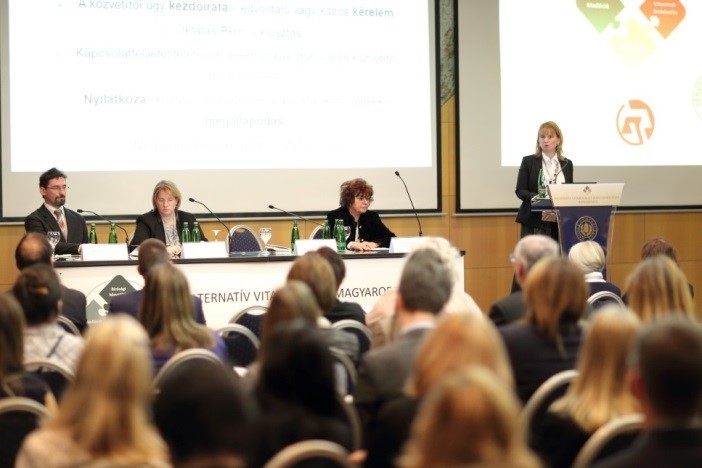
The series of presentations on court mediation was closed by Dr. Bernadett Bazsó by presenting the results of court mediation to date. Between 1 January 2013 and 30 June 2016, 2,462 mediation procedures were conducted by domestic court mediators on a voluntary basis or based on a binding resolution, half of which, i.e. 1,239 procedures ended with a settlement agreement. The latest figures suggest that in almost 40 per cent of the actions continued after the procedures closed without a settlement agreement, the parties agreed in a court settlement very fast, often already at the first hearing.
In his presentation entitled “Mediation and/or coercion”, Dr. Ádám Tóth, President of the Hungarian Chamber of Civil Notaries, spoke about the notaries' connection to mediation procedures. It may be a good means for the parties to strengthen trust, if they record their agreement in a notarial document in cases not affected by a dispute. During the procedure the notary performs unbiased administration of justice, in compliance with the strict statutory provisions protecting the parties' interests. He emphasised that efforts should be made in the future to make mediation publicly known, to ensure that people voluntarily resort to it as widely as possible and decide their own matters in a definitive and reassuring way.
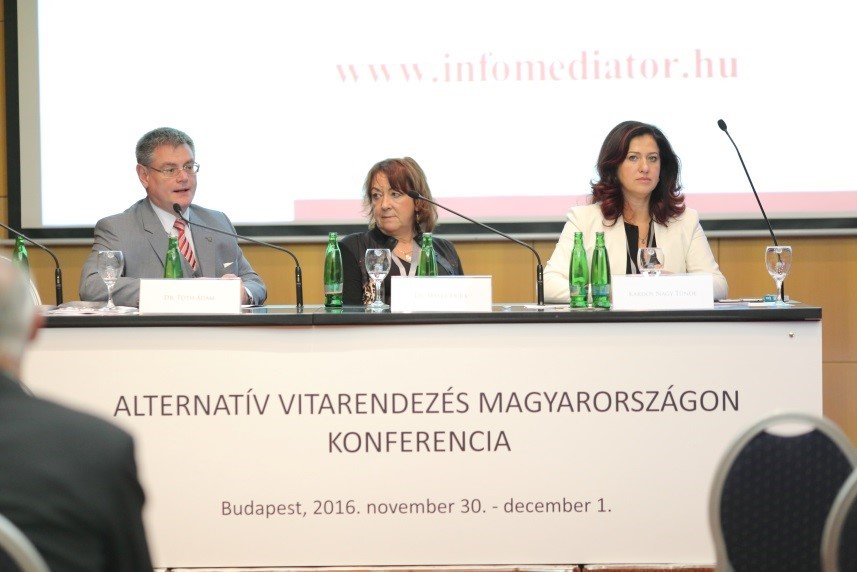
In her presentation entitled “Alternative dispute resolution in the .hu domain: functioning of the Consulting Board and the Registration Arbitrator”, Dr. Erika Mayer described the special features of the system of the Consulting Board and Registration Arbitrator. Probably this is the least known form of alternative dispute resolution. And it is also very special. In her presentation she said that the arbitrator's procedure is in a domain somewhere outside the conciliation board system, the arbitration court and mediator procedure; this is due to the fact that no mediation takes place here; its purpose is to make a decision, and the acting arbitrators are chosen not by the parties. The arbitrator's system is an out-of-court dispute resolution method, which takes place on a dedicated online platform, available only for the petitioner and the respondent; it is launched upon request and it is very fast.
The Consulting Board and the registration arbitrator platform have been in operation since 2000 and 2005, respectively; the decisions are public since 2009. She emphasised that the success thereof is also evidenced by the fact that there has been not a single case in which the judicial forum passed a different judgement than the arbitrator's resolution.
On the second day of the conference Dr. Zsuzsa Wopera, ministerial commissioner (Ministry of Justice), presented the provisions of the new Code of Civil Procedure, passed by the National Assembly in November 2016, aimed at the fostering of litigation avoidance. She said that prior to bringing an action, the summoning for attempted settlement will be introduced, and in view of the divided suit structure, it also appears as a rule fostering the avoidance of litigation, when after the resolution closing the appearance phase, the judge attempts to create a settlement agreement between the parties; as part of this the judge informs the parties about the possibility of resorting to mediation procedures.
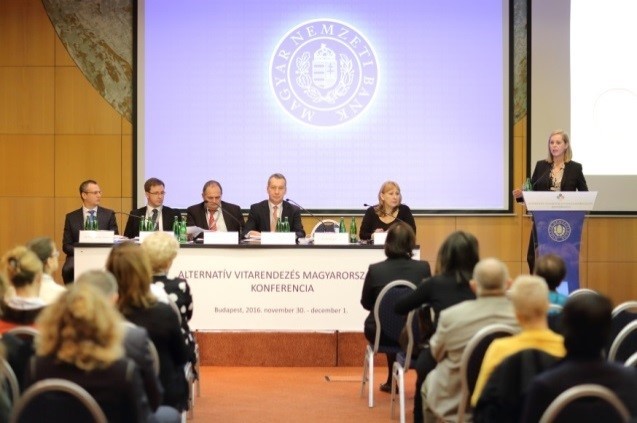
The topic of out-of-court mediation was opened by Dr. József Szecskó, deputy under-secretary of state of the Ministry of Justice, in charge of justice services, with his presentation on the special features of the legislative regulation of out-of-court mediation. He mentioned that in its register of mediators, the Ministry of Justice has 1,155 natural persons and more than 300 legal persons. The number of mediation procedures between 2010 and 2016 increased fivefold, which shows that mediation is gaining ground, receives an increasing attention and demand for it is on the rise, which is attributable, among others, to skilled mediators. In his view, out-of-court mediation within the legislative and institutional framework works well, if the parties' trust is unfaltering, and both the parties and the mediators believe in the efficiency and usefulness of the litigation avoidance function.
In his presentation entitled “Mediation in the life of enterprises”, Dr. Zoltán Kiss, President of the Budapest Chamber of Commerce and Industry, talked about the way of implementing alternative dispute resolution in the relation of enterprises to settle disputes quickly with the assistance of the mediation centre and arbitration court operated by the chamber, and the conciliation board operating under the chamber. He emphasised that the greatest advantages of the alternative dispute resolution include speed, cost efficiency and effectiveness, this is why it is necessary to integrate the alternative dispute resolution culture more deeply in the life of enterprises and make it a common knowledge.
In his presentation on mediation in economic matters Dr. András Szilágyi, President of the Mediation and Legal Coordination Department at the Budapest Chamber of Commerce and Industry, emphasised that the Chamber is the only mediation service provider operating in the form of a public body, which means that its independence and impartiality during its operation is prescribed by law. In his presentation he also mentioned that in economic matters the conflicts are typically organised around conflicts of interest and information, in most of cases the problem is caused by disinformation. In the disputes the parties are characterised by a fight for position, and the bridge in the resolution of the disputes between the parties is created by the mediation procedure. The essence and sense of the agreements in the mediation procedure is that they are reached as a result of a dialogue, and the parties conclude them in good faith in a mutually beneficial way.
A presentation on the mediation in criminal and petty offence cases was held by Dr. Tamás Szeiberling, Director General of the Office of Justice. He stated that the purpose of mediation in criminal cases is to reach a consensus, reconciliation and forgiveness between the injured party and the accused, and to reduce the workload of the authorities. The application of the mediation procedure in criminal law was introduced in 2006, in which the mediation is performed by patron inspectors. At present 60 mediators perform mediation in criminal and petty offence cases. In the ongoing criminal cases 2,500 and 9,000 mediations were performed in 2007 and in 2015, respectively. More than 90 per cent of the settlement agreements concluded in criminal cases were fulfilled by the accused, while this ratio in petty offence cases was 95 per cent.
The presentation of the domestic mediation scheme was opened by Nikoletta Keszthelyi, deputy under-secretary of state in the Ministry of National Development, in charge of consumer protection, who talked about the operation of conciliation boards and their achievements to date. She said that from 2004 conciliation boards gained higher importance. They guarantee alternative dispute resolution between undertakings and consumers with fast and free of charge procedure, short procedural time and proper expertise. She mentioned that from 2015 it is mandatory for undertakings to appear at procedures conducted by conciliation boards, failing to do so would entail a fine. In recent years, the legislator also strengthened the role of boards by, among others, cancelling the rule that consumers must turn with the resolution of their dispute to the conciliation board having competence based on their place of residence; instead they may resort to the procedure of any board. She emphasised the importance of the implementation in the Hungarian legislative system of the EU's ADR directive on alternative dispute resolution as a result of the approximation of laws, and that from 2016 consumers also may resort to online dispute resolution in the case of service or sales contracts concluded online. She emphasised that alternative dispute resolution is a real alternative to court procedure, as in the absence of this consumers would not be able to enforce their legitimate claims, if their only option was to choose the costly and time-consuming court procedure.
In his presentation on conciliation in consumer disputes Dr. Zsolt Hajnal, President of the Conciliation Board of Hajdú-Bihar County, presented the special features of conciliation and the future possibilities of the legal institution.
In order to make alternative dispute resolution as efficient as possible, create uniform consumer protection and for the smooth operation of the online platform, consumers should be self-confident and vested with high level rights, and the possibilities of enforcing their rights should be easily accessible for them. With the introduction of the statutory obligation to cooperate, service providers' constructive approach was stabilised and their willingness to conclude a compromise also rose. According to the speaker, the key positive result of conciliation is moral compensation and a settlement agreement to the satisfaction of the parties. Among the challenges of 2017, he mentioned the pressure to become professional and the increasing justification of online conciliation, in view of online consumer habits of future generations.
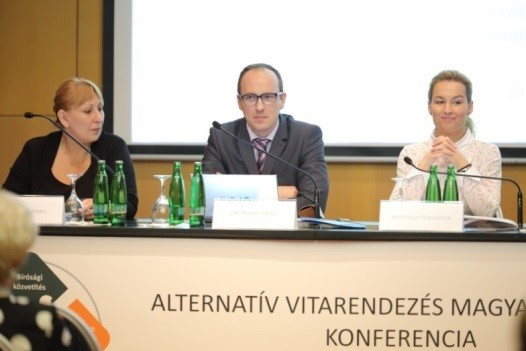
In her speech, Dr. Erika Kovács, Chair of the Financial Arbitration Board, presented the history, rules and procedure of conciliation in financial consumer disputes, the key milestones of the period elapsed since the Board's establishment in 2011, and she outlined the special features of the operation of financial conciliation compared to other conciliation boards.
She said that in the process of financial conciliation, in terms of its duties, the Board explores the legal situation, mediates and also spreads financial literacy. Its primary objective is to create consensus between the parties, but when there is an infringement and the parties are unable to agree, it makes a decision. The range of service providers involved in the procedure comprise of financial service providers licensed and supervised by the Magyar Nemzeti Bank; consumers may turn to the Board with individual disputes related to these. In her presentation, she touched upon the scheme of submission, and presented in detail the institution of statutory submission, introduced on1 January 2017, which applies to consumer claims not exceeding the limit of one million forints.
As a summary, she stated that during the five years of the Board's operation, it received more than 38,000 petitions, of which 16,500 were related to the statutory settlement. In her experience, it shows an increase in financial literacy that the number of petitions that were suitable in every respect for commencing the procedure and conducting it on the merits is increasing.
The series of presentations on arbitration courts was opened by Dr. Lajosné Balog, Member of the Presidium of the Arbitration Court organised under the Hungarian Chamber of Commerce and Industry, where she described the most important provisions of the Act on Arbitration Courts and the rules applicable to the individual phases of the procedure. Józsefné Lukács Dr. delivered a speech on dispute resolution at the Arbitration Court organised under the Hungarian Chamber of Commerce and Industry, in which she emphasised that this permanent court of arbitration is the most prestigious arbitration court with the longest history in Hungary. During its almost seventy years of history, it was able to operate not only in the period of market economy, but also during the socialist state-run economy. She emphasised that the advantages of the arbitration procedure, among others, include speed, the settlement of actions at a single level and cost efficiency. The majority of the cases are international disputes.
In her presentation, Dr. Adrienne Kraudi, President of the Permanent Court of Arbitration of the Money and Capital Market, stated that the activity of the Permanent Court of Arbitration of the Money and Capital Market is comprehensive, and it plays a defining role on disputes related to the service activity of large financial and investment service providers. An arbitration clause may be included in the contract, or the parties may opt for it also when the dispute arises. It is the latter case when it fulfils its real alternative dispute resolution function. The procedure is conducted at a single level, and must end within a short deadline with an enforceable resolution. The speaker highlighted fiduciary administration during the procedures, in view of the fact that the parties involved in the dispute are financial service providers, investment and stock exchange service providers.
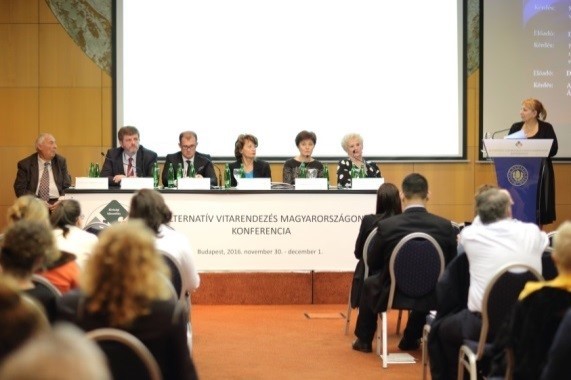
In his presentation on dispute resolution at the Permanent Arbitration Court for Energetics, Dr. Zoltán Faludi, President, talked about the purpose and benefit of the arbitration court's establishment. Here the primary consideration was to ensure the assessment of disputes in a fast, professional and credible manner, since the actors of this sector require, due to the nature of the sector, immediate decision in their disputes, and cannot afford suffering losses arising from the progress of time. They deal with disputes arising from production contracts, gas wholesale contracts and contracts concluded for energy renovation of institutions, but their competence is not exclusive. As regards the future, he emphasised that the arbitration court intends to stop the continuous fall in the number of energy sector players by exercising the international competence of the arbitration court and thereby increasing the number of its procedures.
In his presentation on disputes related to agricultural activity, Dr. Zoltán Mikó, President of the Permanent Court of Arbitration operating under the Hungarian Chamber of Agriculture, said that in the arbitration system the plaintiff and the defendant each elects an arbitrator from the list of arbitrators, and the selected arbitrators jointly designate the chair of the acting panel, thereby also ensuring impartiality of the procedure. Subject to the parties' mutual will, it is also possible to elect one arbitrator, due to cost saving considerations. The acquisition and, more importantly, the maintenance of public trust, is an important principle upon the establishment and operation of the arbitration court.
In his presentation on dispute resolution at the Permanent Arbitration Court for Sport, Prof. Dr. Tamás Sárközy, said that the competence of the Permanent Arbitration Court for Sport extends to matters specified in the Sports Act. The Permanent Arbitration Court for Sport is the only arbitration court, which may be resorted to not only on the basis of submission, but also in respect of signing on, transfer and disciplinary matters. He stated that the fastest arbitration procedure takes place here, as the acting arbitrator is appointed in 8 days, the hearing is held within 15 days and the arbitration court passes its decision within a further 15 days.
A press conference was also held in the break of the conference, in which Tünde Handó, President of the National Office for the Judiciary, László Windisch, Deputy Governor of the Magyar Nemzeti Bank, Nikoletta Keszthelyi, under-secretary of state in charge of consumer protection, and Erika Kovács, Chair of the Financial Arbitration Board, presented the area represented by them and answered the questions of the press representatives.
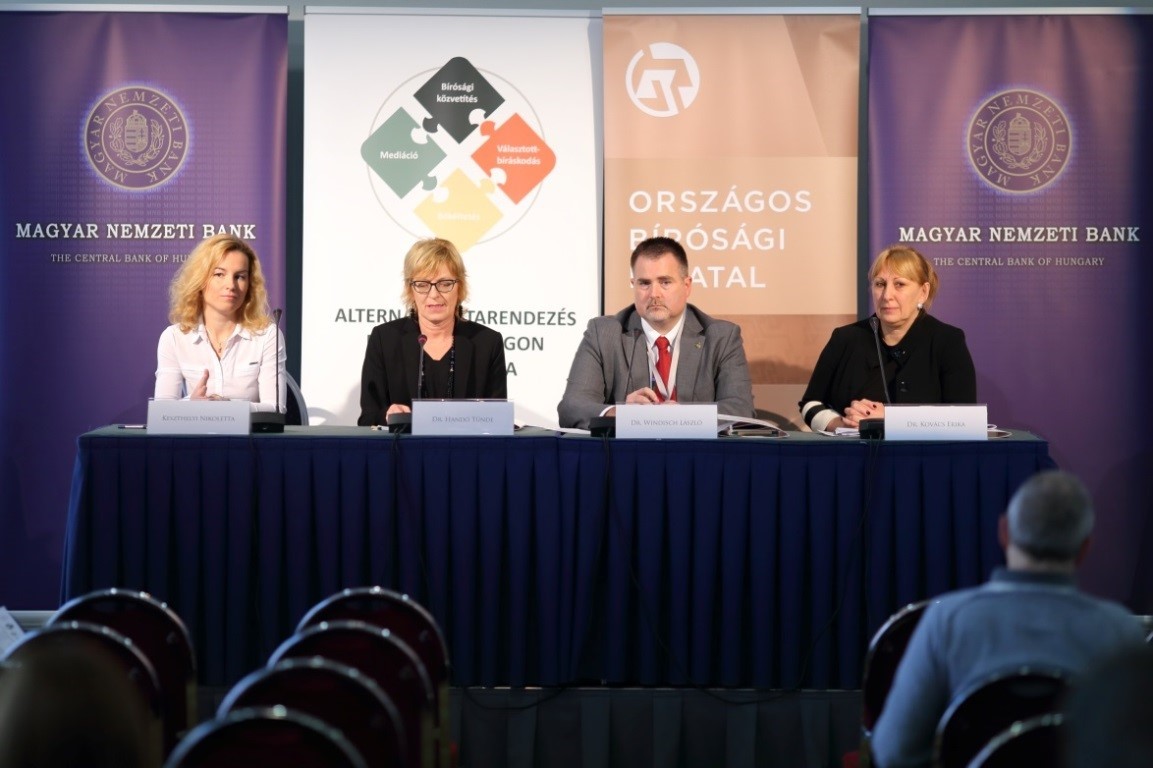
The press showed great interest both before and after the conference, which hopefully will increase the reputation of alternative dispute resolution organisations and promote this form of dispute resolution.